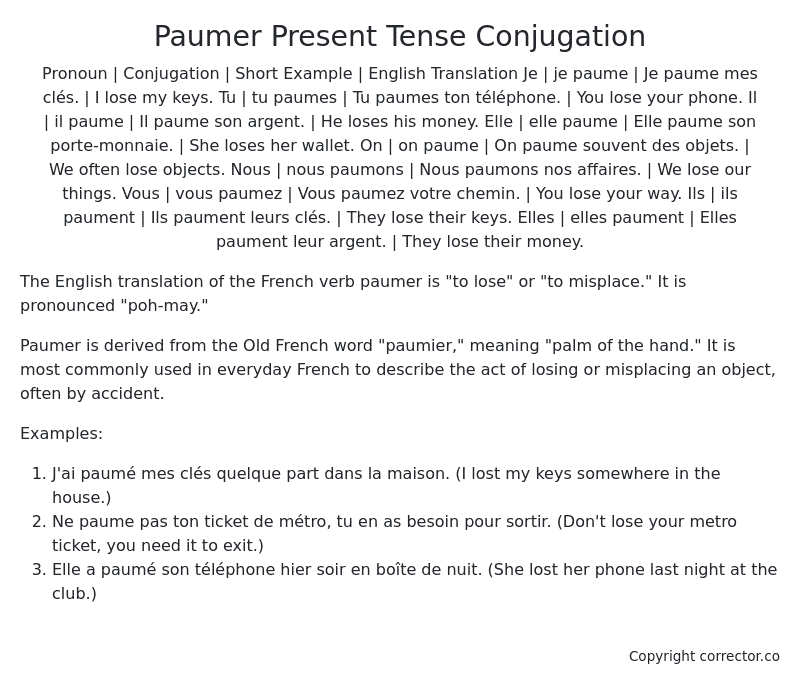Le Present (Present Tense) Conjugation of the French Verb paumer
Introduction to the verb paumer
The English translation of the French verb paumer is “to lose” or “to misplace.” It is pronounced “poh-may.”
Paumer is derived from the Old French word “paumier,” meaning “palm of the hand.” It is most commonly used in everyday French to describe the act of losing or misplacing an object, often by accident.
Examples:
- J’ai paumé mes clés quelque part dans la maison. (I lost my keys somewhere in the house.)
- Ne paume pas ton ticket de métro, tu en as besoin pour sortir. (Don’t lose your metro ticket, you need it to exit.)
- Elle a paumé son téléphone hier soir en boîte de nuit. (She lost her phone last night at the club.)
Paumer – About the French Present Tense
To take a deep dive into all the French tenses then see our article on Mastering French Tense Conjugation.
Common Everyday Usage Patterns For Le Present
Interactions with Other Tenses
Table of the Present Tense Conjugation of paumer
Pronoun | Conjugation | Short Example | English Translation
Je | je paume | Je paume mes clés. | I lose my keys.
Tu | tu paumes | Tu paumes ton téléphone. | You lose your phone.
Il | il paume | Il paume son argent. | He loses his money.
Elle | elle paume | Elle paume son porte-monnaie. | She loses her wallet.
On | on paume | On paume souvent des objets. | We often lose objects.
Nous | nous paumons | Nous paumons nos affaires. | We lose our things.
Vous | vous paumez | Vous paumez votre chemin. | You lose your way.
Ils | ils paument | Ils paument leurs clés. | They lose their keys.
Elles | elles paument | Elles paument leur argent. | They lose their money.
Other Conjugations for Paumer.
Le Present (Present Tense) Conjugation of the French Verb paumer (this article)
Imparfait (Imperfect) Tense Conjugation of the French Verb paumer
Passé Simple (Simple Past) Tense Conjugation of the French Verb paumer
Passé Composé (Present Perfect) Tense Conjugation of the French Verb paumer
Futur Simple (Simple Future) Tense Conjugation of the French Verb paumer
Futur Proche (Near Future) Tense Conjugation of the French Verb paumer
Plus-que-parfait (Pluperfect) Tense Conjugation of the French Verb paumer
Passé Antérieur (Past Anterior) Tense Conjugation of the French Verb paumer
Futur Antérieur (Future Anterior) Tense Conjugation of the French Verb paumer
Subjonctif Présent (Subjunctive Present) Tense Conjugation of the French Verb paumer
Subjonctif Passé (Subjunctive Past) Tense Conjugation of the French Verb paumer
Subjonctif Imparfait (Subjunctive Imperfect) Tense Conjugation of the French Verb paumer
Subjonctif Plus-que-parfait (Subjunctive Pluperfect) Tense Conjugation of the French Verb paumer
Conditionnel Présent (Conditional Present) Tense Conjugation of the French Verb paumer
Conditionnel Passé (Conditional Past) Tense Conjugation of the French Verb paumer
L’impératif Présent (Imperative Present) Tense Conjugation of the French Verb paumer
L’infinitif Présent (Infinitive Present) Tense Conjugation of the French Verb paumer
Struggling with French verbs or the language in general? Why not use our free French Grammar Checker – no registration required!
Get a FREE Download Study Sheet of this Conjugation 🔥
Simply right click the image below, click “save image” and get your free reference for the paumer Present Tense tense conjugation!

I hope you enjoyed this article on the verb paumer. Still in a learning mood? Check out another TOTALLY random French verb present conjugation!


